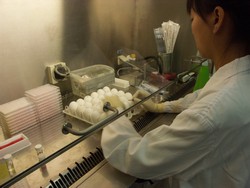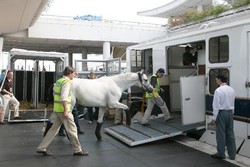
|
|||||||
| FARM INSPECTIONS | |||||||
| To protect the general population from an avian influenza outbreak, the Department has imposed biosecurity requirements on local poultry farms, in addition to the implementation of its universal compulsory vaccination programme. Every batch of local chickens is also tested for avian influenza, and only chickens with negative results are allowed to be sold for human consumption. In 2006-07, AFCD staff conducted more than 8 400 inspections of local livestock farms and quarantined 1 299 pigs imported for breeding purposes. One pig farm was convicted of offences for using prohibited chemicals. | 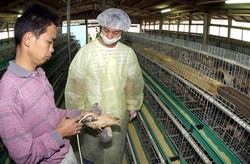 |
||||||
| VETERINARY DIAGNOSTIC LABORATORY | |||||||
The demand for the testing of animal pathogens, chemical residues in pre-slaughtered food animals and for veterinary diagnostic support continued to increase during the year. Over 8 700 requests were received for animal, bird and fish disease investigation. About 298 000 tests for avian influenza, and over 113 000 for chemical residue monitoring were conducted.
To safeguard the population against an avian influenza outbreak, the Department continued its year-round programme to monitor and screen for the presence of the virus at various sites considered to be at risk, such as poultry farms, the wholesale poultry market, pet shops, recreational parks and nature reserves. Dead wild birds were also collected and tested daily. From April 2006 to March 2007, over 42 000 carcasses and faecal swab samples were collected at various locations and tested for the virus. Except for 15 wild birds found dead at various locations during January to March 2007, the highly pathogenic H5N1 avian influenza virus was not detected in any sample. The number of positive cases found was considered to be normal for the period and similar to that found in the previous year. |
|
||||||
PREVENTION OF AVIAN INFLUENZA |
|||||||
In addition to poultry farm inspections and veterinary diagnostic laboratory services, the Department continued to play an active role against avian influenza (AI) through a number of measures. To enforce the legislation enacted in February 2006 to ban the keeping of backyard poultry (chickens, ducks, geese, pigeons and quails), Departmental staff patrolled all local villages and seized about 490 poultry. Offenders are liable to a fine of $50,000 to $100,000. In October 2006, a three-day course was conducted by the Department to train its staff on emergency response procedures in the event of an AI outbreak. As part of the course, a poultry culling exercise, codenamed “Operation Lily”, was conducted at a farm in the New Territories. Staff from both the AFCD and the Centre for Health Protection (CHP) participated in the exercise. To raise public awareness of the AI control programme, the Department, together with the CHP and Food and Environmental Hygiene Department (FEHD), jointly held an AI forum in November 2006, to introduce Avian Flu control measures and contingency plans to the District Councils and the public. The Department from time to time issued reminders to relevant religious organisations not to release birds to the wild. Organisations contacted agreed to cooperate and inform their members about the advice. |
|||||||
| CONTROL OF PESTICIDES | |||||||
To fulfil HKSAR’s obligations under the Stockholm Convention and Rotterdam Convention, the Department is taking steps to revise the Pesticides Ordinance to regulate the export, transhipment and transit of convention-listed pesticides. The new control regime would better guard against the misuse of pesticides. In early 2007, a public consultation campaign was conducted. The Department will take into account the comments received in taking forward the exercise. Due to increasing public awareness of mosquito-borne diseases and the consequential increase in the use of pesticides, the Department continued to conduct seminars to educate the public and other government departments on the safe use of pesticides in mosquito control in 2006-07. Statistics on pesticide control are at Appendix 8. |
|||||||
ANIMAL AND PLANT QUARANTINE CONTROL |
|||||||
As the animal import and export control authority in Hong Kong, the Department is responsible for ensuring that all cross-border animal movements are closely monitored to prevent the introduction of animal diseases into Hong Kong. Special permits issued by the Department are required for the import of live animals and birds in accordance with the Public Health (Animals and Birds) Ordinance (Cap. 139) and the Rabies Ordinance (Cap. 421). Importing animals and birds without a special permit is liable to prosecution. In 2006-07, a total of 5 078 permits were issued for the import/transit of live animals and birds. To comply with the import requirements of destination places, the Department issues animal health certificates to facilitate the export of animals and birds from Hong Kong. In 2006-07, a total of 2 834 applications for Animal Health Certificates were processed by the Department. To facilitate the import of animals or birds into Hong Kong, the Department has launched a new document screening service since September 2006. Before submitting their applications, all applicants are given advice on how to fill out the applications properly and how they could comply with import requirements. By allowing applicants to make the necessary arrangements, the service has resulted in a reduction in the number of animals/birds required to go through quarantine and the incidence of owners/importers being prosecuted for non-compliance with permit terms. |
|||||||
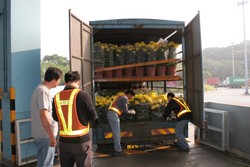 |
To prevent the introduction and spread of the Red Imported Fire Ant (RIFA), Solenopsis invicta, into Hong Kong, the Department continued to strengthen its communications with the Mainland’s quarantine authorities and stepped up inspection of plants at the border. Specimen identification, training workshops, and technical advice on control measures were also provided to other government departments, the public and commercial pest extermination companies. |
||||||
The Department invited the Chinese Academy of Inspection and Quarantine of the General Administration of Quality Supervision, Inspection and Quarantine to conduct a pest risk analysis of the territory in 2005. The project was completed in early 2007. The results are being taken account into in reviewing the Plant (Importation and Pest Control) Ordinance (Cap. 207). Statistics on plant import controls and phytosanitary certification services are at Appendix 7. |
|||||||
ANIMAL WELFARE |
|||||||
Under the law, all animal traders have to be licensed. In 2006, some 530 Animal Trader Licences were issued, covering the trade of dogs, cats, pet birds, food birds and food reptiles. The amended Prevention of Cruelty to Animals Ordinance (Cap. 169) came into effect in December 2006. Anyone found guilty of cruelty to animals shall be liable to a maximum fine of $200,000 and imprisonment for 3 years. An Announcement in the Public Interest (API) was introduced in December 2006 to inform the public of the increase in penalty for animal cruelty. To further promote animal welfare and responsible pet ownership, the Department staged a roving exhibition entitled “Respect Life, Treat Them Well” from January to June 2007. Public awareness programmes covering both the media and public transport system were also conducted. In addition, the Department and the Society for the Prevention of Cruelty to Animals (SPCA) joined forces to organise and conduct various publicity campaigns and operations against animal cruelty. The Department also conducted training on gathering of evidence, conducting decoy operations and court procedures for SPCA staff. |
|||||||
PREVENTION OF RABIES |
|||||||
| An API was introduced in February 2007 to educate the public on the dangers of rabies. During the year, a total of 59 000 dogs were licensed and vaccinated against rabies. To safeguard the public from aggressive dogs and cats and to improve environmental hygiene, some 9 000 stray dogs and 5 000 stray cats were caught or handled during the year. Healthy animals with good temperaments would be selected for re-homing. About 800 animals were re-homed through animal welfare organisations. | 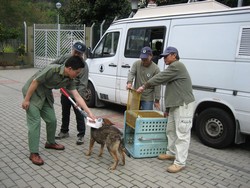 |
||||||
2008 OLYMPIC AND PARALYMPIC EQUESTRIAN EVENTS |
|||||||
The Games of the XXIX Olympiad will be held in Beijing in 2008, and Hong Kong has been selected to stage the Equestrian Events for both the Olympic and Paralympic Games. As the inspection and quarantine authority for animals, AFCD will be responsible for enforcing the protocol requirements regarding the import and re-export of horses that will participate in the Equestrian Events, as well as horse feed and bedding material of plant origin. In addition, the Department will be responsible for monitoring the stabling and welfare of all horses participating in the Equestrian Events. |
|||||||
|
|||||||
